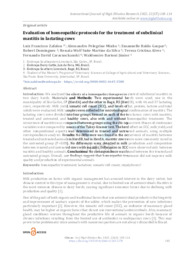Evaluation of homeopathic protocols for the treatment of subclinical mastitis in lactating cows.
Evaluation of homeopathic protocols for the treatment of subclinical mastitis in lactating cows.
Autoria: ZAFALON, L. F.; MINHO, A. P.; GASPAR, E. B.; SUÑÉ, R. W.; DOMINGUES, R.; CARACUSCHANSKI, F. D.; ALVES, T. C.; BARIONI JUNIOR, W.
Resumo: We analyzed the effects of a homeopathic therapies to control subclinical mastitis in two dairy herds. Two experimental herds were used, one in the municipality of São Carlos, SP (Herd A) and the other in Bagé, RS (Herd B), with 46 and 37 lactating animals, respectively. Milk yield, somatic cell count (SCC), and levels of fat, protein, lactose and total solids were evaluated. Milk samples were collected for microbiological confirmation of mastitis. The lactating cows were divided into four groups formed on each of the two farms: cows with mastitis, treated and untreated, and healthy cows, also with and without homeopathic treatment. The occurrence of mastitis was compared between groups using the chi-square test. Means of continuous variables were compared by means of the Tukey-Kramer test. The herd effect on SCC, milk yield, and other compositional aspects was determined in treated and untreated animals, using multiple correspondence analysis. Results: No difference was found in the occurrence of mastitis between treated and untreated animals in Herd B, but in Herd A, mastitic cows were more commonly cured in the untreated group (P<0.05). No differences were detected in milk production and composition between treated and untreated cows with mastitis. Differences in SCC were observed only between mastitic and healthy animals because of heightened cellular response to the invasion of the mammary gland by microorganisms. Conclusions: No correspondence was found between the treated and untreated groups. Overall, our findings suggest that homeopathic treatment did not improve milk quality and production of experimental animals.
Ano de publicação: 2022
Tipo de publicação: Artigo de periódico
Unidade: Embrapa Pecuária Sudeste
Palavras-chave: Doença Animal, Homeopatia, Homeophatic Treatment, Lactation, Lactação, Mamite, Somatic cell count, Staphylococci
Observações
1 - Por padrão são exibidas publicações dos últimos 20 anos. Para encontrar publicações mais antigas, configure o filtro ano de publicação, colocando o ano a partir do qual você deseja encontrar publicações. O filtro está na coluna da esquerda na busca acima.
2 - Para ler algumas publicações da Embrapa (apenas as que estão em formato ePub), é necessário ter, no celular ou computador, um desses softwares gratuitos. Sistemas Android: Google Play Livros; IOS: iBooks; Windows e Linux: software Calibre.
Acesse outras publicações
Acesse a Base de Dados da Pesquisa Agropecuária (BDPA) para consultar o acervo completo das bibliotecas da Embrapa.

